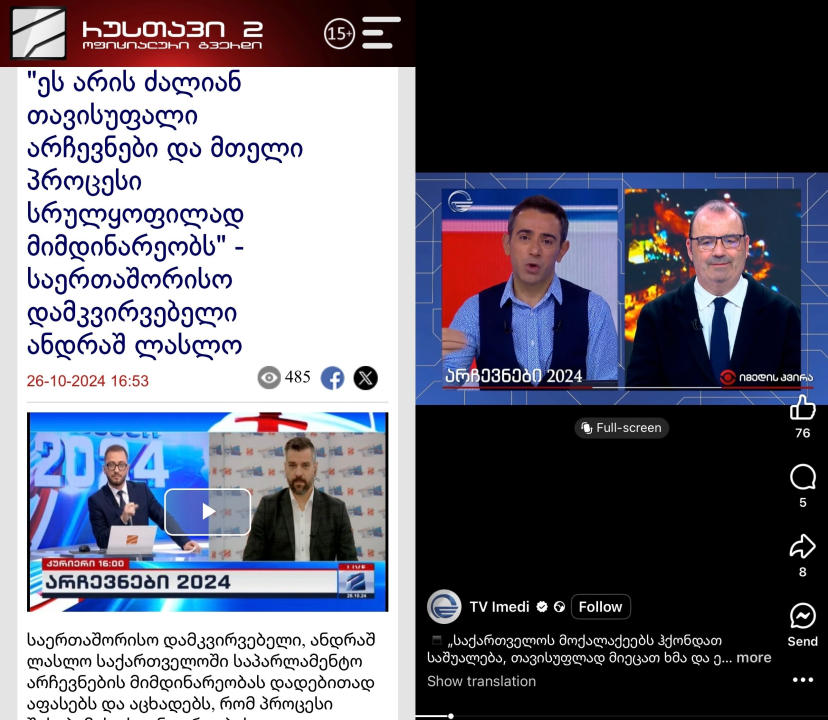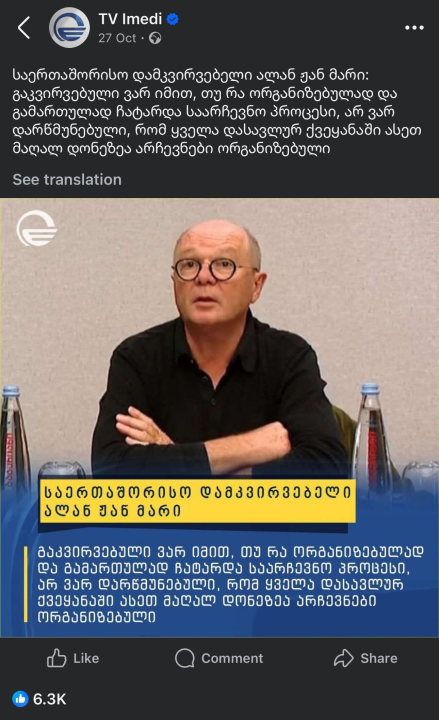Politically biased observers attempted to legitimize fraudulent elections in Georgia
Ruling party media amplified coverage of nearly two dozen individuals to portray them as credible election observers
Politically biased observers attempted to legitimize fraudulent elections in Georgia

Banner: Biased election observers participated in live broadcast interviews on government-affiliated media to help whitewash the fraudulent elections. (Source: TV Imedi/archive)
In collaboration with the European Platform for Democratic Elections (EPDE), the DFRLab exposed 23 politically biased international observers who contributed to legitimizing the fraudulent 2024 Georgian parliamentary election. These observers, which EPDE refer to as “fake observers,” issued statements that deliberately distorted the reality of the electoral process, portraying it in a false light favoring the ruling Georgian Dream party. These statements subsequently served as fodder for media outlets affiliated with Georgian Dream. By leveraging television broadcasts, websites, and social media platforms, these outlets amplified false and misleading narratives, presenting them as evidence of positive assessments from international observers. This effort aimed to bolster the legitimacy of the election while masking widespread irregularities and fraud.
According to EPDE, fake observers are individuals and groups ostensibly participating in election monitoring but lack impartiality and a reliable methodology. The goal of fake observers is to validate flawed elections, weaken democratic processes, and in the words of EPDE, “neutralize criticism from credible organizations like the Organization for Security and Co-operation in Europe / Office for Democratic Institutions and Human Rights (OSCE/ODIHR) and independent domestic election observers, predominantly by propaganda in the host country.” The phenomenon, tried and tested method in regimes like Russia and Azerbaijan, surfaced in Georgia’s most recent parliamentary election on October 26, 2024.
The election highlighted the significant decline of democratic principles under the Georgian Dream. According to the press release by OSCE/ODIHR, “Numerous issues noted in our final report negatively impacted the integrity of these elections and eroded public trust in the process.” According to an assessment by three independent Georgian election observation missions, the pre-election period and election day were marred by extensive misuse of administrative resources, voter intimidation, severe breaches of vote secrecy, alterations to the Central Election Commission’s composition and procedures, manipulation of voter identification, and other violations. The organizations concluded that the election was “rigged to favor the ruling party.” EPDE stated that “to mask the fraudulent electoral process, politically biased observers were incorporated into the process to support the official Georgian Dream narrative, including representatives from Western democracies and members of the European, national, [and] regional parliaments” to project an appearance of legitimacy.
In Georgia, serving as an election observer requires accreditation from the Central Election Commission (CEC), which some civil society and election watchdog organizations suspect is controlled by the ruling Georgian Dream party. The CEC accredited 76 international observation organizations, including reputable entities like OSCE/ODIHR, NDI, and IRI, as well as various lesser-known groups, to provide a total of over 1,700 observers. Notably, only 23 of these observers were interviewed or quoted by Georgian Dream-affiliated TV Imedi and Rustavi 2, and all made highly positive comments about the elections. Given that these 23 individuals were not representatives of prominent organizations like OSCE/ODIHR, it suggests that the Georgian Dream-aligned media outlets selectively interviewed observers they knew would support their agenda and reinforce Georgian Dream’s official narrative.
Tactics used by government-affiliated media to promote biased observers
An analysis of coverage on the websites and social media of Georgian Dream-affiliated media stations TV Imedi and Rustavi 2 revealed key trends in their presentation of statements from these fake observers:
- Emphasis on the “international” label. In their coverage, they consistently referred to these individuals as “international observers” without providing specific details about their credentials or organizational affiliations. Often, no names were mentioned, and the focus remained on the label “international observer” to lend an air of legitimacy.
- Emphasis on countries. The coverage conspicuously omitted the affiliations of these observers, revealing only their alleged countries of origin, highlighting that they were, for example, from France, Germany, or another Western country. This tactic seemingly aimed to bolster the credibility of the observers without inviting scrutiny into their backgrounds.
- Confusion over names. A notable pattern of inconsistent and erroneous naming emerged in the media’s reports. Observers’ names and surnames were frequently misspelled or mistranslated, making it difficult to verify their identities. In some cases, individuals were referred to by entirely different names, and one French name was used for three separate people. Whether these discrepancies resulted from intentional obfuscation or careless reporting remains unclear, but they further clouded the authenticity of the observers.
- Amplification on social media. Statements from the fake observers were widely disseminated on Facebook, the most popular platform in Georgia, where posts featured eye-catching posts highlighting their comments. These posts garnered significant engagement, in some instances up to 7,000 reactions per post.
The observers in question
Politically biased observation missions present at 2024 Georgian Parliamentary elections included individuals and groups from France, Germany, Poland, and Hungary, among other countries (the full list is available on the EPDE website). Some of them have a track record of helping to whitewash fraudulent elections in Russia and Azerbaijan.
At least four individuals were present as observers from the Hungarian semi-state foundation, the Center for Fundamental Rights, which is aligned with Hungarian President Viktor Orban.

Following the elections, at least two members participating in the group, Jorge González-Gallarza and Candela Sol Silva, published opinion pieces further attempting to legitimize the Georgian elections and promote Georgian Dream party. TV Imedi’s website published three articles based on Jorge González-Gallarza’s piece and promoted it on their Facebook page. According to Candela Sol Silva’s social media accounts, she serves as the president of the Argentinian Youth branch of Italy’s far-right ruling party, Brothers of Italy, led by Prime Minister Giorgia Meloni.
Another biased observer present in Georgia was Ulrich Singer, a member of Germany’s Bavarian State Parliament from Alternative fur Deutschland (AfD). AfD, a far-right populist party with ties to Russia, was described as “Russia’s best friend in Germany” by German public broadcaster Deutsche Welle. “I didn’t see any kind of violation and they didn’t report anything, everything was calm,” Singer stated after monitoring elections in Marneuli, a city in Georgia where legitimate observers documented one of the most evident instances of election fraud.
Also in attendance was Polish national Ryszard Henryk Czarnecki, a former member of European parliament (MEP) and a member of the Law and Justice (PiS) party. Czarnecki has been involved in various scandals, including corruption allegations and casting a severe insult at fellow MEP Róża Thun, which ultimately resulted in his removal from the position of Vice-President of the European Parliament for “serious breaches” of the rules of procedure.
There were also five French nationals, including Marc Gairin, Mayor of Momy, and Loup Bommier, Mayor of Gurgy-le-Château, who are representatives of France’s far-right parties, the Rassemblement National and the Union des Droites pour la République, respectively. Another far right French individual monitoring the Georgian elections was François Giquel, executive director of the French organization SOS Chrétiens d’Orient (SOSCO). A 2021 investigation by the New Lines Institute for Strategy and Policy revealed that SOSCO maintained a direct relationship with the Assad regime and funded pro-regime militias. Gicquel also participated in an event organized by the Kremlin-run Gorchakov Foundation.
Amplification through Georgian media
Georgian Dream-affiliated media outlets actively covered and disseminated statements from all 23 identified fake international observers, quoting some of them in articles, either in written form or through embedded videos, while featuring others in live interviews. Among those interviewed live were András László, a Hungarian MEP from Orban’s Fidesz party and Luke Uribe-Etxebarria Apalategi, a member of the Basque Parliament from Basque National Party.
TV Imedi is widely regarded as a government-affiliated media outlet, closely adhering to the propaganda of the ruling Georgian Dream party. In recent years, the network has exclusively interviewed and promoted individuals whose narratives aligned with that of Georgian Dream. The fact that Imedi and Rustavi 2 interviewed both László and Uribe-Etxebarria Apalategi strongly suggests that both outlet were confident they would present the election in a positive light in alignment with the Georgian Dream narrative. Otherwise, it is highly unlikely that they would have risked featuring them in live interviews, the very nature of which could jeopardize the channels’ political agenda.
On election day, László participated in a live broadcast interview with Rustavi 2, stating, “Everything is happening in accordance with the relevant regulations, according to the rules. The general view, which our experience dictates to us, is that these are very free elections and the entire process is going perfectly.” He added that everything was happening “in accordance with the highest standards of free and fair elections.”
Uribe-Etxebarria Apalategi participated in a live broadcast interview with TV Imedi a day after the elections. He stated that “minor violations were not systematic” and claimed that “more than 3,000 polling stations were operating yesterday, with only 11 reporting certain violations.” He further added that it is “necessary” to respect the outcome of the parliamentary elections held in Georgia.

While some biased observers were quoted in articles in written form, the video footage of others was embedded on the website after airing on news broadcasts.
Social media amplification
Georgian-Dream-affiliated media also promoted comments from biased election observers on their social media platforms, sharing articles and posts which garnered significant attention and interaction. A search for the term “international observer” in Georgian on the Facebook pages of TV Imedi and Rustavi 2 revealed extensive efforts by these media outlets to promote and amplify the comments of the individuals in question. Their quotes promoted as Facebook posts garnered thousands of reactions and shares, while their comments featured in articles received hundreds of reactions and shares.
One Facebook post by TV Imedi, which received over 6,300 reactions and 500 shares, highlighted a quote from an “international observer” under the false name Allan Jean-Marie, who claimed, “I am surprised by how organized and proper the election process was. I am not sure that elections in all Western countries are organized at such a high level.” However, an investigation by the Georgian fact-checking organization Media Development Foundation revealed that the individual’s real name is Alain Avril, and he has no connection to politics or elections, being instead the founder of a clothing brand, thus making him a “fake” observer in terms of both bias and inauthenticity.

Cite this case study:
Eto Buziashvili, “Politically biased observers attempted to legitimize fraudulent elections in Georgia,” Digital Forensic Research Lab (DFRLab), January 13, 2025, https://dfrlab.org/2025/01/13/fake-observers-georgia/.

